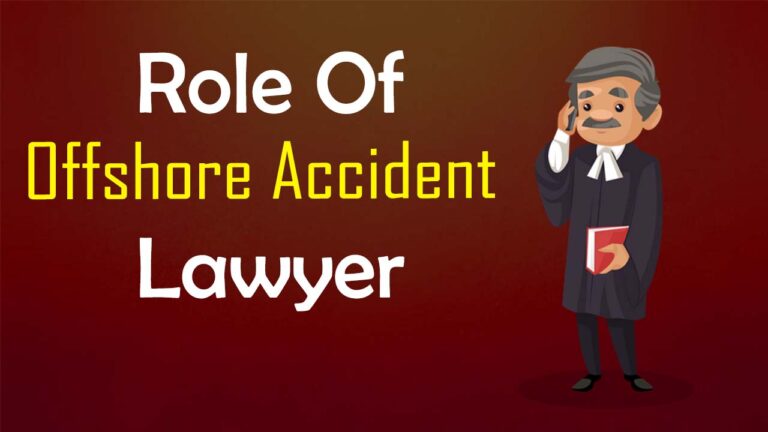Offshore accidents can be complex and challenging to navigate, often resulting in severe injuries, financial loss, and emotional distress for those involved. In such cases, seeking the assistance of a qualified offshore accident lawyer is crucial to ensure that your rights are protected, and you receive the compensation you deserve. This article aims to shed light on the role of offshore accident lawyers, their expertise, and frequently asked questions (FAQs) to help you make informed decisions during challenging times.
Understanding Offshore Accident Lawyers: Offshore accident lawyers specialize in maritime law and are well-versed in the unique challenges presented by accidents that occur at sea. Whether it’s an oil rig incident, ship collision, or any other maritime mishap, these legal professionals are equipped to handle the intricacies of such cases.
Key Responsibilities of Offshore Accident Lawyers:
- Legal Representation: Offshore accident lawyers provide legal representation for individuals who have suffered injuries or losses as a result of maritime accidents. They work tirelessly to build a strong case and negotiate on behalf of their clients.
- Investigation: Lawyers in this field conduct thorough investigations into the circumstances surrounding the accident. This includes gathering evidence, interviewing witnesses, and collaborating with experts to establish liability.
- Navigating Maritime Laws: Maritime law is a specialized area that governs offshore activities. Offshore accident lawyers are well-versed in the Jones Act, the Longshore and Harbor Workers’ Compensation Act (LHWCA), and other relevant laws that pertain to offshore accidents.
- Negotiation and Litigation: These lawyers are skilled negotiators, working with insurance companies and opposing parties to secure fair settlements. In cases where negotiations fail, they are prepared to take the matter to court and advocate for their clients during litigation.
types of offshore accident lawyers:
Maritime Personal Injury Lawyer: These lawyers specialize in representing individuals who have suffered injuries while working in maritime occupations. Whether it’s on an oil rig, ship, or any other offshore facility, maritime personal injury lawyers help victims pursue compensation for medical expenses, lost wages, pain and suffering, and other damages.
Jones Act Lawyer: The Jones Act provides protections for seamen injured due to the negligence of their employers or fellow crew members. Jones Act lawyers specifically handle cases involving offshore workers covered by this federal law. They navigate the unique legal requirements of the Jones Act to ensure their clients receive the compensation they deserve.
Admiralty and Maritime Lawyer: These attorneys have a broad focus on admiralty and maritime law, which covers a wide range of legal issues related to navigation, commerce, and marine activities. Admiralty and maritime lawyers may handle cases involving collisions, cargo disputes, salvage operations, and other matters that occur on navigable waters.
Offshore Oil Rig Accident Lawyer: Specializing in accidents that occur on offshore oil rigs, these lawyers understand the specific challenges and risks associated with the oil and gas industry. They handle cases involving explosions, fires, equipment failures, and other incidents, seeking compensation for workers who have been injured or families who have lost loved ones.
Environmental Lawyer: In cases where offshore accidents result in environmental damage, environmental lawyers step in. They may represent individuals, communities, or environmental organizations affected by oil spills, pollution, or other ecological disasters, seeking compensation and advocating for environmental remediation.
Longshore and Harbor Workers’ Compensation Act (LHWCA) Lawyer: The LHWCA provides benefits to maritime workers who are not covered by the Jones Act, such as longshoremen, harbor workers, and certain other categories of maritime employees. Lawyers specializing in LHWCA cases help these workers pursue compensation for work-related injuries and occupational diseases.
Offshore Accident Litigation Lawyer: Lawyers specializing in offshore accident litigation handle the legal aspects of taking a case to court. They may be involved in filing lawsuits, presenting evidence, cross-examining witnesses, and negotiating settlements. These attorneys are well-versed in the procedural and evidentiary requirements of maritime litigation.
Cruise Ship Accident Lawyer: Focused on accidents and injuries that occur on cruise ships, these lawyers represent passengers or crew members seeking compensation for incidents such as slip and falls, medical malpractice, or other cruise-related injuries.
Having a specialized offshore accident lawyer who understands the nuances of the specific type of accident is crucial for successfully navigating the complexities of maritime law and achieving the best possible outcome for the injured parties.
Types of offshore accident lawyers:
Maritime Personal Injury Lawyer: These lawyers specialize in representing individuals who have suffered injuries while working in maritime occupations. Whether it’s on an oil rig, ship, or any other offshore facility, maritime personal injury lawyers help victims pursue compensation for medical expenses, lost wages, pain and suffering, and other damages.
Jones Act Lawyer: The Jones Act provides protections for seamen injured due to the negligence of their employers or fellow crew members. Jones Act lawyers specifically handle cases involving offshore workers covered by this federal law. They navigate the unique legal requirements of the Jones Act to ensure their clients receive the compensation they deserve.
Admiralty and Maritime Lawyer: These attorneys have a broad focus on admiralty and maritime law, which covers a wide range of legal issues related to navigation, commerce, and marine activities. Admiralty and maritime lawyers may handle cases involving collisions, cargo disputes, salvage operations, and other matters that occur on navigable waters.
Offshore Oil Rig Accident Lawyer: Specializing in accidents that occur on offshore oil rigs, these lawyers understand the specific challenges and risks associated with the oil and gas industry. They handle cases involving explosions, fires, equipment failures, and other incidents, seeking compensation for workers who have been injured or families who have lost loved ones.
Environmental Lawyer: In cases where offshore accidents result in environmental damage, environmental lawyers step in. They may represent individuals, communities, or environmental organizations affected by oil spills, pollution, or other ecological disasters, seeking compensation and advocating for environmental remediation.
Longshore and Harbor Workers’ Compensation Act (LHWCA) Lawyer: The LHWCA provides benefits to maritime workers who are not covered by the Jones Act, such as longshoremen, harbor workers, and certain other categories of maritime employees. Lawyers specializing in LHWCA cases help these workers pursue compensation for work-related injuries and occupational diseases.
Offshore Accident Litigation Lawyer: Lawyers specializing in offshore accident litigation handle the legal aspects of taking a case to court. They may be involved in filing lawsuits, presenting evidence, cross-examining witnesses, and negotiating settlements. These attorneys are well-versed in the procedural and evidentiary requirements of maritime litigation.
Cruise Ship Accident Lawyer: Focused on accidents and injuries that occur on cruise ships, these lawyers represent passengers or crew members seeking compensation for incidents such as slip and falls, medical malpractice, or other cruise-related injuries.
Having a specialized offshore accident lawyer who understands the nuances of the specific type of accident is crucial for successfully navigating the complexities of maritime law and achieving the best possible outcome for the injured parties.
Lawyers typically charge for their services in one of the following ways:
- Hourly Rate: Many lawyers charge clients an hourly rate for their time. The hourly rate can vary significantly depending on the lawyer’s experience and the region. More experienced lawyers usually command higher hourly rates.
- Contingency Fee: In some cases, personal injury lawyers, including those handling offshore accident cases, may work on a contingency fee basis. This means that the lawyer only gets paid if they successfully recover compensation for their client. The fee is usually a percentage of the amount recovered, and if the case is not successful, the lawyer does not receive payment.
- Flat Fee: Some lawyers may charge a flat fee for specific legal services related to an offshore accident. This is more common for straightforward or routine legal matters.
It’s essential to discuss fees and payment arrangements with the lawyer during the initial consultation. Make sure to clarify how the lawyer charges for their services, whether it’s hourly, contingency-based, or a flat fee. Additionally, inquire about any additional costs that may be associated with the case, such as court fees, expert witness fees, or travel expenses.
Keep in mind that legal fees are just one aspect to consider when hiring a lawyer. The lawyer’s experience, expertise, and track record in handling offshore accident cases are also crucial factors in making an informed decision.
Frequently Asked Questions (FAQs) about Offshore Accident Lawyers:
- What types of cases do offshore accident lawyers handle? Offshore accident lawyers handle a wide range of cases, including oil rig accidents, ship collisions, crew member injuries, and other incidents that occur in navigable waters.
- Who is eligible to seek the services of an offshore accident lawyer? Anyone who has suffered injuries or losses due to an offshore accident, including offshore workers, seamen, and passengers, may seek the services of an offshore accident lawyer.
- How is compensation determined in offshore accident cases? Compensation in offshore accident cases may cover medical expenses, lost wages, pain and suffering, and other damages. The amount is determined based on the severity of injuries, liability, and other factors.
- What is the Jones Act, and how does it apply to offshore accidents? The Jones Act is a federal law that allows seamen to sue their employers for negligence, seeking compensation for injuries sustained while working offshore.
- What is the statute of limitations for filing an offshore accident claim? The statute of limitations varies depending on the nature of the accident and the applicable laws. It is crucial to consult with an offshore accident lawyer promptly to ensure compliance with deadlines.
The fees of an offshore accident lawyer can vary based on several factors, including the attorney’s experience, reputation, the complexity of the case, and the jurisdiction in which the case is being handled. Offshore accidents often involve maritime law, which can be intricate and specialized, influencing the cost of legal representation.











I will so happy
Gfxbj
Man
229
My gril friend insta pasword
I love you 💗😘💗😘💗 💗💗💗😘😘😘😘💗😘😘💗💗😘💗😘😘😘😘💗💗😘💗😘😘 to baby
My Richarg
Tq
Free recharge
Tq
Tq
Thank you
Thank you
Please try again 😭 please Annaya ❤️ please please please please please please please please please please I will so happy
199
Ajjajwhwhwhwuwjagay hiatus from the year and I have a good day and I am so proud of the year old are going through the night and the year old are going to the new phone📱 and the other side and the other side and I am a very happy birthday🎉 is a new❤️🩹 one day of school of school of the year and the other day and I have to do with a new phone and I am so excited to be a good day of school and the year old boy I was in my heart and the other side of the year
Tq so much
Hi
Super super excited
Thanks annya
Tq Brother
pls do recharge pls 🙏🙏
Hi
September 16,2024 at 8:30 pm
Annya pls do recharge
Please free recharge
Ok tq
Thank you andi
Tp anna
😍😍😍😍😍😍😍😍😍😍😜😍😍😍😍😍😍😍😍😍🥰🥰
Free recharge
Please give me reacharge
Please give me reacharge
Please give me recharge
Airtel
Jio
recharge du ledhu pokka ledu
Thank you bro
It’s not moving.
Tq
Tq
Please give me recharge brooo
Please give me recharge b
rooo
Thank you for free recharge